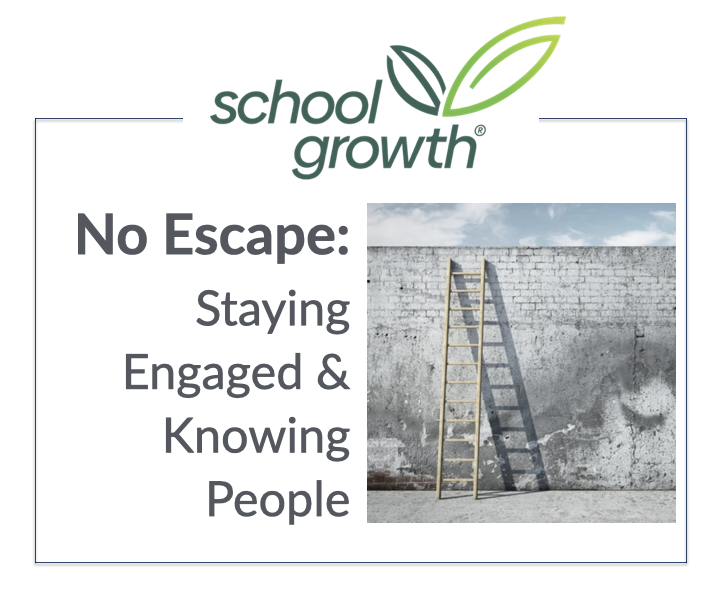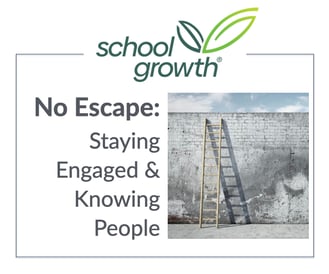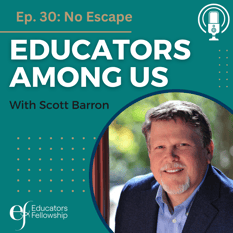
No Escape: Staying Engaged and Knowing People

Part of the adventure of life and leadership as an educator is really listening to people and learning the rest of the story, where we let them safely reveal their thoughts and motivations to deepen trusted connections.
We never know how our small activities
will affect others through the invisible fabric
of our connectedness. In this exquisitely connected
world, it's never a question of 'critical mass.'
It's always about critical connections.
— Grace Boggs
Ever found yourself singing a song and then started really thinking about the lyrics? Tammy and I were sitting at a restaurant when "Escape" by Rupert Holmes came on. It's a catchy melody, of course, but the lyrics are really quite sad. It's about a couple trying to covertly escape their relationship because of a failure to listen and know each other.
A key line in the song is, "I never knew...." That's a miserable reality for lots of people, where they lack the care and curiosity to go beyond the surface to understand another's hopes, needs, and fears.
I never knew you were experiencing so much pain in your life.
I never knew you wanted to do that.
I never knew you didn't like this.
I never knew you needed me to use a different approach.
I never knew you were so gifted in that area.
I never knew you.
Sometimes this lack of connection is because of the decision to escape. As educators, we can be tempted to escape ...
... into the classroom or office to avoid people and relationships.
... into a hectic pace of work life that keeps us too busy to engage.
... into creating an us against them mentality that fosters distrust.
A vital skill in the repertoire of an educator is knowing how to respectfully value those inner details because one of the greatest joys is experienced when people approach our school at the start of the day knowing that someone inside knows them and looks forward to seeing them.
Can we realistically say that we fully appreciate our colleagues, students, and others? The truth is that we know only that little portion or percentage to which we actually pay attention. Disinterest is more common because it requires no effort.
Genuinely knowing someone requires investment of time and energy because the words they express provide only a partial picture, with the balance revealed through deeper inquiry and conversation. Then you can use words of encourage to build them up, believe in them, and help them believe in themselves.
Suggested questions to ask to get to know someone more clearly:
- What’s been on your heart and mind recently?
- What are you most proud of about yourself?
- What are your priorities/goals this year?
- What kind of person do you want to be? Why?
- If you had a whole day where you could do anything you wanted, what would you do?
- What do you feel has been your greatest “win” so far in life?
That's how you can cut through all the red tape, refuse to escape, and truly know them for life-changing influence.
Love'em and Lead'em!
Checkout all the episodes of the Educators Among Us Podcast

.png?width=1000&height=199&name=SG-Logo3-Transparent-1000x199px%20(1).png)



.jpg?width=100&height=100&name=elementary%20student%20squeezing%20a%20stuffed%20animal%20while%20holding%20their%20breath%20(1).jpg)

